高考英语词汇agree with,agree to的用法
agree的用法有哪些agree的固定短语搭配
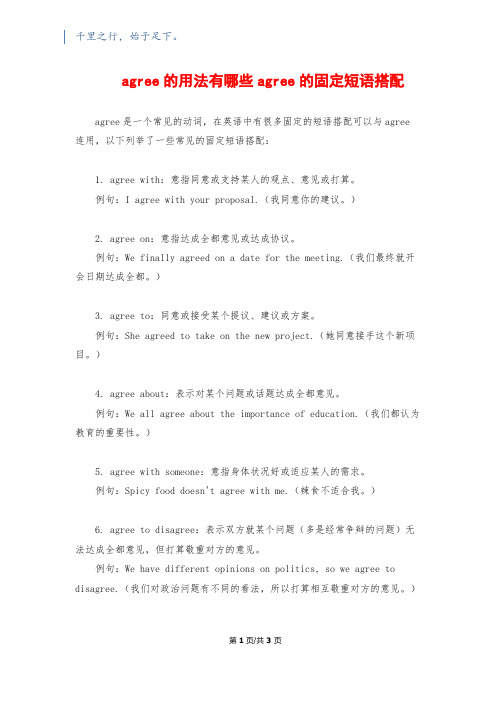
千里之行,始于足下。
agree的用法有哪些agree的固定短语搭配agree是一个常见的动词,在英语中有很多固定的短语搭配可以与agree 连用,以下列举了一些常见的固定短语搭配:1. agree with:意指同意或支持某人的观点、意见或打算。
例句:I agree with your proposal.(我同意你的建议。
)2. agree on:意指达成全都意见或达成协议。
例句:We finally agreed on a date for the meeting.(我们最终就开会日期达成全都。
)3. agree to:同意或接受某个提议、建议或方案。
例句:She agreed to take on the new project.(她同意接手这个新项目。
)4. agree about:表示对某个问题或话题达成全都意见。
例句:We all agree about the importance of education.(我们都认为教育的重要性。
)5. agree with someone:意指身体状况好或适应某人的需求。
例句:Spicy food doesn't agree with me.(辣食不适合我。
)6. agree to disagree:表示双方就某个问题(多是经常争辩的问题)无法达成全都意见,但打算敬重对方的意见。
例句:We have different opinions on politics, so we agree to disagree.(我们对政治问题有不同的看法,所以打算相互敬重对方的意见。
)第1页/共3页锲而不舍,金石可镂。
7. agree in principle:表示在原则上同意某个提议或建议,但细节问题需要进一步争辩和协商。
例句:I agree in principle, but we need to work out the details.(我原则上同意,但我们需要争辩和解决细节问题。
Agree to与Agree with的分别

Agree to与Agree with的分别按agree with是「赞成」,其受词可以是人、计划、分析、建议等,例如:(1) I agree with the proposal(我赞成这个建议)。
(2) I agree with his analysis of the situation(我同意他对情况的分析)。
(3) I agree with every word you’ve just said(你刚才说的每一个字我都同意)。
agree to则可能不赞成,但仍然接受,例如:(1) As I had no choice, I had to agree to their very harsh terms(我别无办法,唯有答应他们苛刻的要求)。
(2) I agree to the proposal(我可能不赞成,但仍接受这个建议)。
不少人都听过以下说法:You agree with somebody but agree to something (同意某人的话,是agree with;同意某件事,是agree to)。
但请看张道真《现代英语用法词典》所引英国小说家沃尔蒲(Hugh Walpole)They might not agree with his opinions (他们未必赞同他的意见)、名作家王尔德(Oscar Wilde)I don't agree with a single word that you have said (你说的话,我一个字都不赞同)二语,你就会发觉「不能说agree with something」的原则子虚乌有。
Sick和ill有甚么分别?Sick、ill都解作「病了」,但英国人多说ill,美国人多说sick。
She is/looks ill或she is/looks sick都是说「她病了/她一脸病容」。
此外,ill一般不会用在名词之前,例如「患病的孩子」多叫a sick child,很少叫an ill child,除非ill字有副词(adverb)修饰,例如a critically ill child(病情危殆的孩子)。
agree with的用法
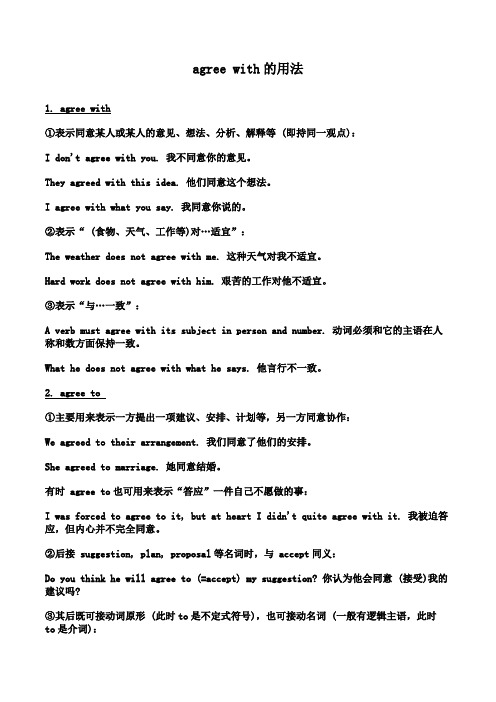
agree with的用法1. agree with①表示同意某人或某人的意见、想法、分析、解释等 (即持同一观点):I don't agree with you. 我不同意你的意见。
They agreed with this idea. 他们同意这个想法。
I agree with what you say. 我同意你说的。
②表示“ (食物、天气、工作等)对…适宜”:The weather does not agree with me. 这种天气对我不适宜。
Hard work does not agree with him. 艰苦的工作对他不适宜。
③表示“与…一致”:A verb must agree with its subject in person and number. 动词必须和它的主语在人称和数方面保持一致。
What he does not agree with what he says. 他言行不一致。
2. agree to①主要用来表示一方提出一项建议、安排、计划等,另一方同意协作:We agreed to their arrangement. 我们同意了他们的安排。
She agreed to marriage. 她同意结婚。
有时 agree to也可用来表示“答应”一件自己不愿做的事:I was forced to agree to it, but at heart I didn't quite agree with it. 我被迫答应,但内心并不完全同意。
②后接 suggestion, plan, proposal等名词时,与 accept同义:Do you think he will agree to (=accept) my suggestion? 你认为他会同意 (接受)我的建议吗?③其后既可接动词原形 (此时to是不定式符号),也可接动名词 (一般有逻辑主语,此时to是介词):He agreed to go with us. 他同意同我们去。
agree的用法和固定搭配
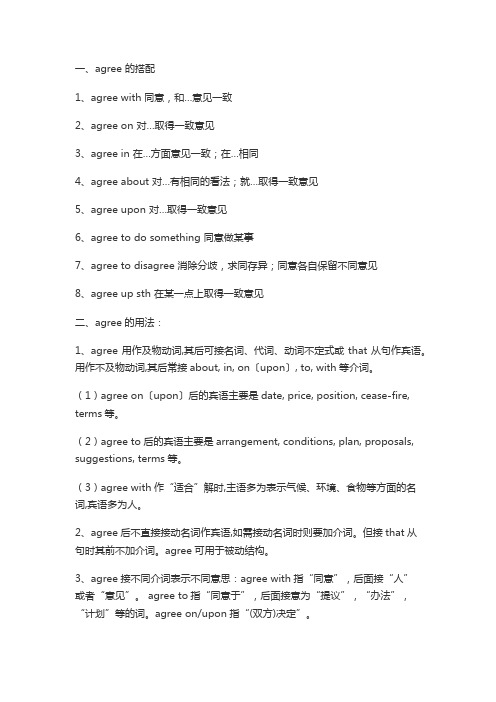
一、agree 的搭配1、agree with 同意,和…意见一致2、agree on 对…取得一致意见3、agree in 在…方面意见一致;在…相同4、agree about 对…有相同的看法;就…取得一致意见5、agree upon 对…取得一致意见6、agree to do something 同意做某事7、agree to disagree 消除分歧,求同存异;同意各自保留不同意见8、agree up sth 在某一点上取得一致意见二、agree的用法:1、agree用作及物动词,其后可接名词、代词、动词不定式或that从句作宾语。
用作不及物动词,其后常接about, in, on〔upon〕, to, with等介词。
(1)agree on〔upon〕后的宾语主要是date, price, position, cease-fire, terms等。
(2)agree to后的宾语主要是arrangement, conditions, plan, proposals, suggestions, terms等。
(3)agree with作“适合”解时,主语多为表示气候、环境、食物等方面的名词,宾语多为人。
2、agree后不直接接动名词作宾语,如需接动名词时则要加介词。
但接that从句时其前不加介词。
agree可用于被动结构。
3、agree接不同介词表示不同意思:agree with指“同意”,后面接“人”或者“意见”。
agree to指“同意于”,后面接意为“提议”,“办法”,“计划”等的词。
agree on/upon指“(双方)决定”。
4、agreed指“互相同意的”,作为不及物动词的过去分词时,可作形容词,后可接that从句。
5、agree也可作为及物动词的过去分词。
agreed to do表示“在别人建议下同意做某事”,而agreed in doing表示“彼此间相互同意做某事”;。
agree with,agree to,agree on的区别.doc
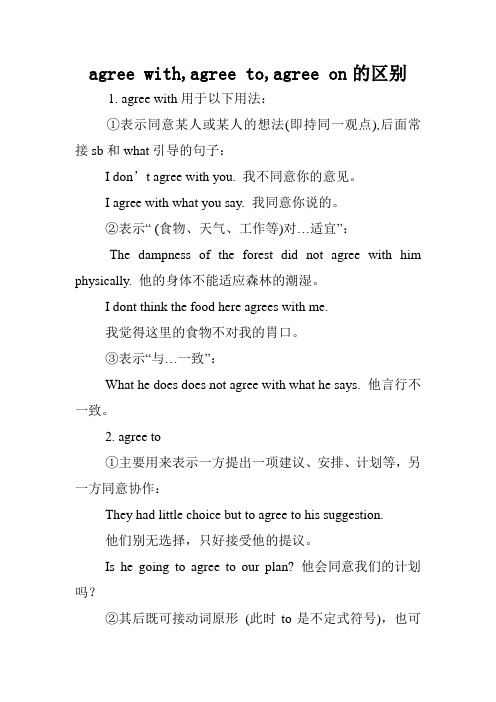
agree with,agree to,agree on的区别1. agree with用于以下用法:①表示同意某人或某人的想法(即持同一观点),后面常接sb和what引导的句子:I don’t agree with you. 我不同意你的意见。
I agree with what you say. 我同意你说的。
②表示“ (食物、天气、工作等)对…适宜”:The dampness of the forest did not agree with him physically. 他的身体不能适应森林的潮湿。
I dont think the food here agrees with me.我觉得这里的食物不对我的胃口。
③表示“与…一致”:What he does does not agree with what he says. 他言行不一致。
2. agree to①主要用来表示一方提出一项建议、安排、计划等,另一方同意协作:They had little choice but to agree to his suggestion.他们别无选择,只好接受他的提议。
Is he going to agree to our plan? 他会同意我们的计划吗?②其后既可接动词原形(此时to是不定式符号),也可接动名词(一般有逻辑主语,此时to是介词):He agreed to go with us. 他同意和我们一起去。
I never agreed to lucy marrying him. 我从来没同意露西嫁给他。
3. agree on [upon]主要指双方通过协商而取得一致意见或达成协议:We agreed on the price. 我们就价格达成了一致意见。
Both sides agreed on these terms. 双方都同意这些条件。
注意:agree 不能接不定式的复合结构,所以汉语的“同意某人做某事”,不能直译为agree sb to do sth, 而应根据情况改用其它结构:他们同意我去。
词义辨析-agreewithagreetoagreeon
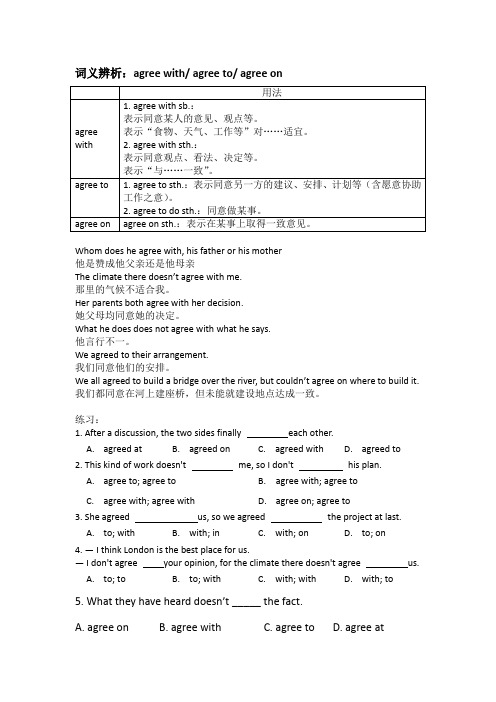
词义辨析:agree with/ agree to/ agree onWhom does he agree with, his father or his mother他是赞成他父亲还是他母亲The climate there doesn’t agree with me.那里的气候不适合我。
Her parents both agree with her decision.她父母均同意她的决定。
What he does does not agree with what he says.他言行不一。
We agreed to their arrangement.我们同意他们的安排。
We all agreed to build a bridge over the river, but couldn’t agree on where to build it.我们都同意在河上建座桥,但未能就建设地点达成一致。
练习:1. After a discussion, the two sides finally each other.A.agreed atB.agreed onC.agreed withD.agreed to2. This kind of work doesn't me, so I don't his plan.A.agree to; agree toB.agree with; agree toC.agree with; agree withD.agree on; agree to3. She agreed us, so we agreed the project at last.A.to; withB.with; inC.with; onD.to; on4. — I think London is the best place for us.— I don't agree your opinion, for the climate there doesn't agree us.A.to; toB.to; withC.with; withD.with; to5. What they have heard doesn’t _____ the fact.A. agree onB. agree withC. agree toD. agree at词义辨析:except/except for/except that/but/besides/apart fromEveryone attended the meeting but/except Mary.大家都出席了这次会议,但玛丽不在其列。
词义辨析-agree with agree to agree on
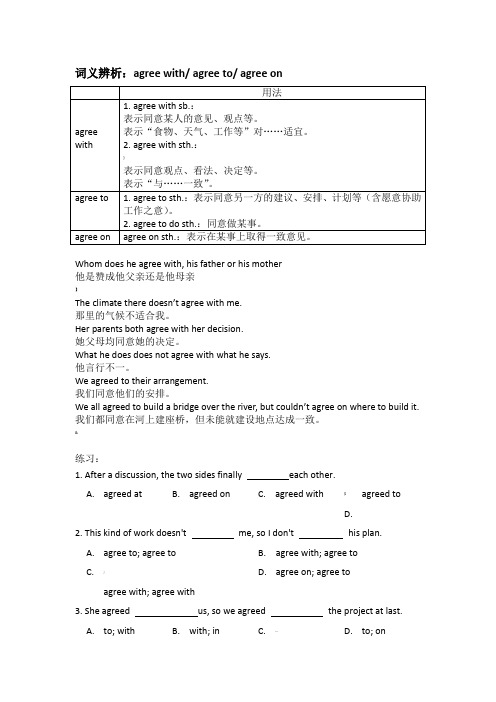
词义辨析:agree with/ agree to/ agree onWhom does he agree with, his father or his mother他是赞成他父亲还是他母亲】The climate there doesn’t agree with me.那里的气候不适合我。
Her parents both agree with her decision.她父母均同意她的决定。
What he does does not agree with what he says.他言行不一。
We agreed to their arrangement.我们同意他们的安排。
We all agreed to build a bridge over the river, but couldn’t agree on where to build it.我们都同意在河上建座桥,但未能就建设地点达成一致。
&练习:1. After a discussion, the two sides finally each other.agreed toA.agreed atB.agreed onC.agreed with$D.2. This kind of work doesn't me, so I don't his plan.A.agree to; agree toB.agree with; agree toD.agree on; agree toC.;agree with; agree with3. She agreed us, so we agreed the project at last.A.to; withB.with; inC.…D.to; onwith; on4. — I think London is the best place for us.— I don't agree your opinion, for the climate there doesn't agreeus.with; with D.with; toA.to; toB.to; with^C.5. What they have heard doesn’t _____ the fact.A. agree onB. agree withC. agree toD. agree at 词义辨析:except/except for/except that/but/besides/apart fromEveryone attended the meeting but/except Mary.大家都出席了这次会议,但玛丽不在其列。
agree的短语搭配及其用法
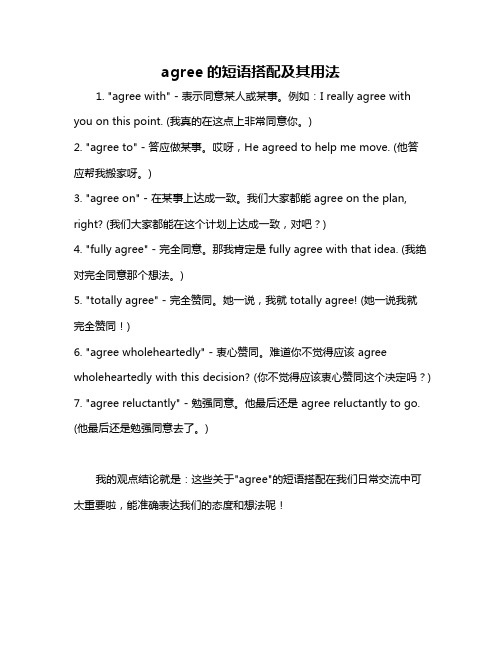
agree的短语搭配及其用法
1. "agree with" - 表示同意某人或某事。
例如:I really agree with you on this point. (我真的在这点上非常同意你。
)
2. "agree to" - 答应做某事。
哎呀,He agreed to help me move. (他答
应帮我搬家呀。
)
3. "agree on" - 在某事上达成一致。
我们大家都能 agree on the plan, right? (我们大家都能在这个计划上达成一致,对吧?)
4. "fully agree" - 完全同意。
那我肯定是 fully agree with that idea. (我绝对完全同意那个想法。
)
5. "totally agree" - 完全赞同。
她一说,我就 totally agree! (她一说我就
完全赞同!)
6. "agree wholeheartedly" - 衷心赞同。
难道你不觉得应该 agree wholeheartedly with this decision? (你不觉得应该衷心赞同这个决定吗?)
7. "agree reluctantly" - 勉强同意。
他最后还是 agree reluctantly to go. (他最后还是勉强同意去了。
)
我的观点结论就是:这些关于"agree"的短语搭配在我们日常交流中可太重要啦,能准确表达我们的态度和想法呢!。
agree的用法(几个重要短语)
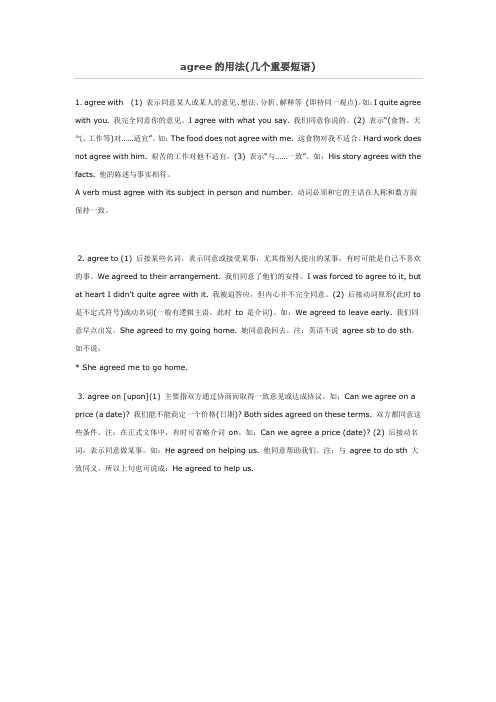
agree的用法(几个重要短语)1. agree with (1) 表示同意某人或某人的意见、想法、分析、解释等(即持同一观点)。
如:I quite agree with you. 我完全同意你的意见。
I agree with what you say. 我们同意你说的。
(2) 表示“(食物、天气、工作等)对……适宜”。
如:The food does not agree with me. 这食物对我不适合。
Hard work does not agree with him. 艰苦的工作对他不适宜。
(3) 表示“与……一致”。
如:His story agrees with the facts. 他的陈述与事实相符。
A verb must agree with its subject in person and number. 动词必须和它的主语在人称和数方面保持一致。
2. agree to (1) 后接某些名词,表示同意或接受某事,尤其指别人提出的某事,有时可能是自己不喜欢的事。
We agreed to their arrangement. 我们同意了他们的安排。
I was forced to agree to it, but at heart I didn’t quite agree with it. 我被迫答应,但内心并不完全同意。
(2) 后接动词原形(此时to 是不定式符号)或动名词(一般有逻辑主语,此时to 是介词)。
如:We agreed to leave early. 我们同意早点出发。
She agreed to my going home. 她同意我回去。
注:英语不说agree sb to do sth。
如不说:* She agreed me to go home.3. agree on [upon](1) 主要指双方通过协商而取得一致意见或达成协议。
如:Can we agree on a price (a date)? 我们能不能商定一个价格(日期)? Both sides agreed on these terms. 双方都同意这些条件。
英语单词agree的三种常见用法详解
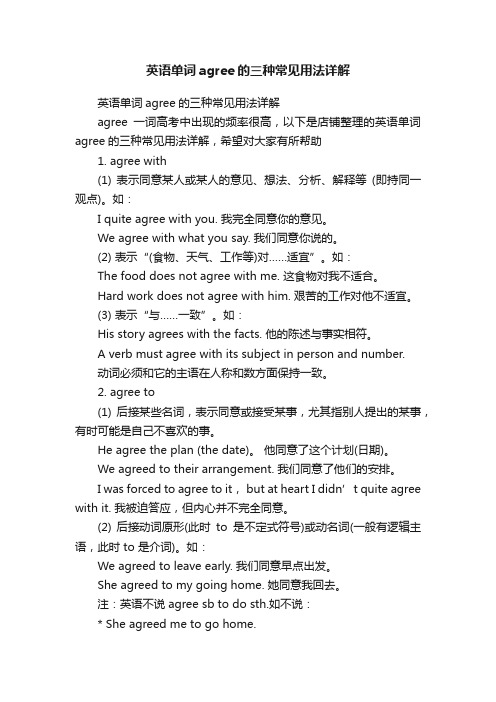
英语单词agree的三种常见用法详解英语单词agree的三种常见用法详解agree一词高考中出现的频率很高,以下是店铺整理的英语单词agree的三种常见用法详解,希望对大家有所帮助1. agree with(1) 表示同意某人或某人的意见、想法、分析、解释等(即持同一观点)。
如:I quite agree with you. 我完全同意你的意见。
We agree with what you say. 我们同意你说的。
(2) 表示“(食物、天气、工作等)对……适宜”。
如:The food does not agree with me. 这食物对我不适合。
Hard work does not agree with him. 艰苦的工作对他不适宜。
(3) 表示“与……一致”。
如:His story agrees with the facts. 他的陈述与事实相符。
A verb must agree with its subject in person and number.动词必须和它的主语在人称和数方面保持一致。
2. agree to(1) 后接某些名词,表示同意或接受某事,尤其指别人提出的某事,有时可能是自己不喜欢的事。
He agree the plan (the date)。
他同意了这个计划(日期)。
We agreed to their arrangement. 我们同意了他们的安排。
I was forced to agree to it,but at heart I didn’t quite agree with it. 我被迫答应,但内心并不完全同意。
(2) 后接动词原形(此时to是不定式符号)或动名词(一般有逻辑主语,此时 to 是介词)。
如:We agreed to leave early. 我们同意早点出发。
She agreed to my going home. 她同意我回去。
注:英语不说 agree sb to do sth.如不说:* She agreed me to go home.3. agree on [upon](1) 主要指双方通过协商而取得一致意见或达成协议。
agree的用法总结
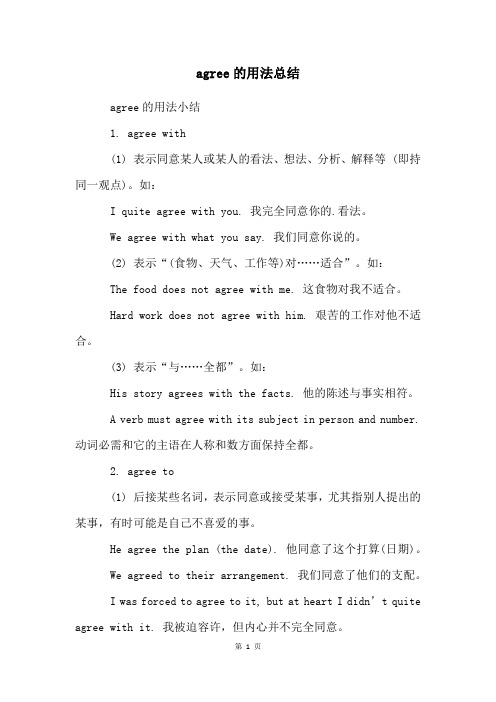
agree的用法总结agree的用法小结1. agree with(1) 表示同意某人或某人的看法、想法、分析、解释等 (即持同一观点)。
如:I quite agree with you. 我完全同意你的.看法。
We agree with what you say. 我们同意你说的。
(2) 表示“(食物、天气、工作等)对……适合”。
如:The food does not agree with me. 这食物对我不适合。
Hard work does not agree with him. 艰苦的工作对他不适合。
(3) 表示“与……全都”。
如:His story agrees with the facts. 他的陈述与事实相符。
A verb must agree with its subject in person and number. 动词必需和它的主语在人称和数方面保持全都。
2. agree to(1) 后接某些名词,表示同意或接受某事,尤其指别人提出的某事,有时可能是自己不喜爱的事。
He agree the plan (the date). 他同意了这个打算(日期)。
We agreed to their arrangement. 我们同意了他们的支配。
I was forced to agree to it, but at heart I didn’t quite agree with it. 我被迫容许,但内心并不完全同意。
(2) 后接动词原形(此时to是不定式符号)或动名词(一般有规律主语,此时 to 是介词)。
如:We agreed to leave early. 我们同意早点动身。
She agreed to my going home. 她同意我回去。
注:英语不说 agree sb to do sth。
如不说:* She agreed me to go home.3. agree on [upon](1) 主要指双方通过协商而取得全都看法或达成协议。
agreewith,agreeto,agreeon的重点用法及其区别

★以下是⽆忧考英语资源频道为⼤家整理的《agree with,agree to,agree on的重点⽤法及其区别》,供⼤家参考。
更多内容请看本站频道。
agree with,agree to,agree on 两者都有“同意”、“赞成”的意思。
agree with 后⾯常接表⽰⼈或意见(看法)的名词作宾语。
agree with 还有“适合”、“符合”的含义。
如:The climate here doesn't agree with him.他不适合这⾥的⽓候。
agree to 后⾯⼀般接表⽰提议、办法、计划之类的名词作宾语。
Do you agree to this change?你同意这样的改变吗?We regret for the loss you have suffered and agree to compensate you by $500.我们对你⽅遭受的损失深表歉意,同意向你们赔偿500美圆。
I fully agree to the arrangement and take delight in it [take it with delight].我完全赞成并乐于接受这⼀安排。
agree on就…达成⼀致的意见。
You and your spouse do not have to agree on politics.你和你的配偶不必在政治上保持⼀致。
Agree on how we measure/test the achievement of the needs and goals.在他们如何度量/测试需求和⽬标的达成⽅⾯达成⼀致。
And where is the point in stoking up fear of China if Americans cannot agree on what to do about it?并且,如果美国⼈都⽆法在采取什么⾏动上取得⼀致,那么⿎动对中国的害怕⼜有什么意义?。
高考英语词汇详解之agree的用法

高考英语词汇详解之agree的用法高考英语词汇详解之agree的用法我们学习英语,能学会所有的因素和发音规则,也有可能掌握所有的语法和规则,但要学会所有的单词是无法做到的。
且不说外语学习者。
即便把英语作为母语使用的人也难以达到这一目标。
以下是店铺整理的高考英语词汇详解之agree的用法,仅供参考,欢迎大家阅读。
高考英语词汇详解之agree的用法11 . agree with表示同意某人或某人的意见、想法、分析、解释等。
如:I quite agree with you. 我完全同意你的意见。
We agree with what you say. 我们同意你说的。
表示“对……适宜”。
如:The food does not agree with me. 这食物对我不适合。
Hard work does not agree with him. 艰苦的工作对他不适宜。
表示“与……一致”。
如:His story agrees with the facts. 他的陈述与事实相符。
A verb must agree with its subject in person and number. 动词必须和它的主语在人称和数方面保持一致。
2 . agree to后接某些名词,表示同意或接受某事,尤其指别人提出的某事,有时可能是自己不喜欢的事。
He agree the plan . 他同意了这个计划。
We agreed to their arrangement. 我们同意了他们的安排。
I was forced to agree to it, but at heart I didn’t quite agree with it. 我被迫答应,但内心并不完全同意。
后接动词原形或动名词。
如:We agreed to leave early. 我们同意早点出发。
She agreed to my going home. 她同意我回去。
agree to 和agree with
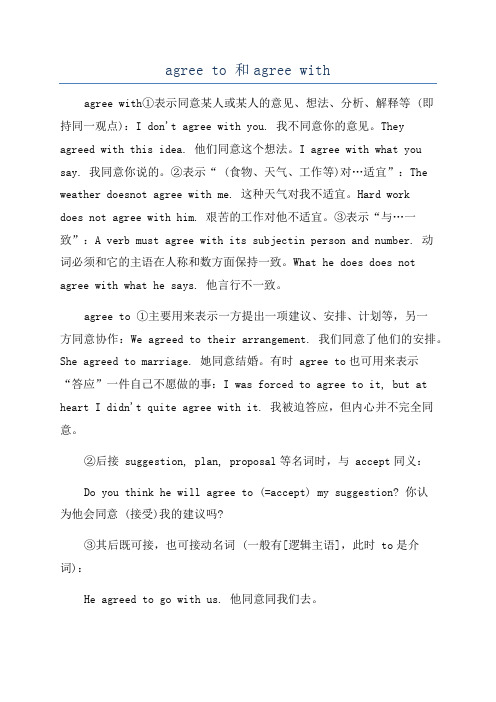
agree to 和agree withagree with①表示同意某人或某人的意见、想法、分析、解释等 (即持同一观点):I don't agree with you. 我不同意你的意见。
They agreed with this idea. 他们同意这个想法。
I agree with what you say. 我同意你说的。
②表示“ (食物、天气、工作等)对…适宜”:The weather doesnot agree with me. 这种天气对我不适宜。
Hard workdoes not agree with him. 艰苦的工作对他不适宜。
③表示“与…一致”:A verb must agree with its subjectin person and number. 动词必须和它的主语在人称和数方面保持一致。
What he does does not agree with what he says. 他言行不一致。
agree to ①主要用来表示一方提出一项建议、安排、计划等,另一方同意协作:We agreed to their arrangement. 我们同意了他们的安排。
She agreed to marriage. 她同意结婚。
有时 agree to也可用来表示“答应”一件自己不愿做的事:I was forced to agree to it, but at heart I didn't quite agree with it. 我被迫答应,但内心并不完全同意。
②后接 suggestion, plan, proposal等名词时,与 accept同义:Do you think he will agree to (=accept) my suggestion? 你认为他会同意 (接受)我的建议吗?③其后既可接,也可接动名词 (一般有[逻辑主语],此时 to是介词):He agreed to go with us. 他同意同我们去。
agree的用法总结
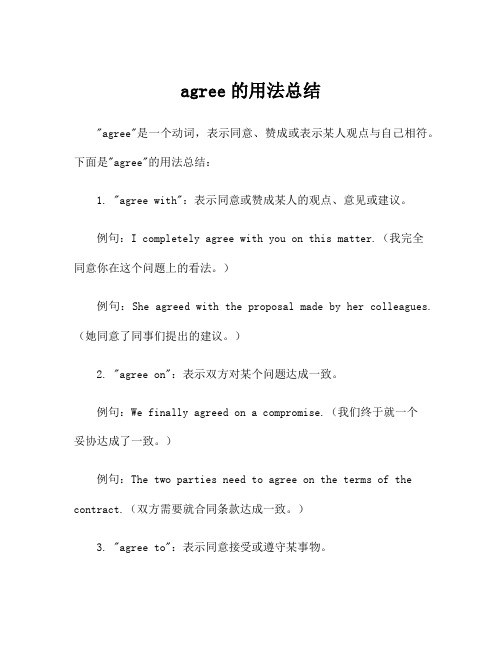
agree的用法总结"agree"是一个动词,表示同意、赞成或表示某人观点与自己相符。
下面是"agree"的用法总结:1. "agree with":表示同意或赞成某人的观点、意见或建议。
例句:I completely agree with you on this matter.(我完全同意你在这个问题上的看法。
)例句:She agreed with the proposal made by her colleagues.(她同意了同事们提出的建议。
)2. "agree on":表示双方对某个问题达成一致。
例句:We finally agreed on a compromise.(我们终于就一个妥协达成了一致。
)例句:The two parties need to agree on the terms of the contract.(双方需要就合同条款达成一致。
)3. "agree to":表示同意接受或遵守某事物。
例句:Will you agree to the proposed changes?(你会同意这些提议的变动吗?)例句:I agreed to their terms and signed the contract.(我同意了他们的条件并签署了合同。
)4. "agree with someone":表示与某人的意见或观点相符。
例句:I agree with Tom that we should start the project as soon as possible.(我同意汤姆的看法,我们应尽快启动这个项目。
)5. "agree to do something":表示同意做某事。
例句:They agreed to meet at the coffee shop later.(他们同意后面在咖啡店见面。
2012高考英语关于agree的用法

2012高考英语关于agree的用法agree vt. & vi. 基本用法如下1)单独使用,表示“同意、答应”等。
如:①I asked him to help me and he agreed.我请求他帮忙,他答应了。
②After a short time, the program was agreed.过了一会儿,这项计划大家都同意了。
2)agree with.① “同意;赞成”agree with+sb /sb’s words /what sb saidagree with sb on/about sth “在某事上同意某人的观点”Do you agree with me about the need for more schools? 关於多建一些学校一事, 你同意我的意见吗?I quite agree with what you said. 我很同意你说的话。
I don"t quite agree with their methods(opinions, ideas).我不太赞成他们的办法(意见,想法)。
② “与……一致”sth agree with sthThe verb must agree with the subject in person and number.动词在人称和数上应与主语一致。
¤③ “(气候,食物)适合” sth agree with sbI like mushrooms but unfortunately they don’t agree with me.我喜欢吃蘑菇, 可惜吃了难受。
3) agree to表示“同意;赞成(提议、安排、计划等)”①I agree to the proposal(the plan). 我同意这个提议(计划)。
②Do you agree to this arrangement?你赞成这个安排吗?③I quite agree to their suggestions. 我很同意他们的建议。
agree的用法
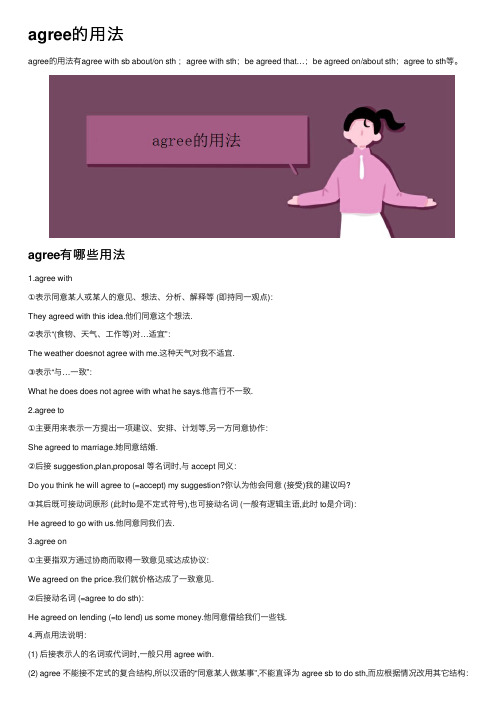
agree的⽤法agree的⽤法有agree with sb about/on sth ;agree with sth;be agreed that…;be agreed on/about sth;agree to sth等。
agree有哪些⽤法1.agree with①表⽰同意某⼈或某⼈的意见、想法、分析、解释等 (即持同⼀观点):They agreed with this idea.他们同意这个想法.②表⽰“(⾷物、天⽓、⼯作等)对…适宜”:The weather doesnot agree with me.这种天⽓对我不适宜.③表⽰“与…⼀致”:What he does does not agree with what he says.他⾔⾏不⼀致.2.agree to①主要⽤来表⽰⼀⽅提出⼀项建议、安排、计划等,另⼀⽅同意协作:She agreed to marriage.她同意结婚.②后接 suggestion,plan,proposal 等名词时,与 accept 同义:Do you think he will agree to (=accept) my suggestion?你认为他会同意 (接受)我的建议吗?③其后既可接动词原形 (此时to是不定式符号),也可接动名词 (⼀般有逻辑主语,此时 to是介词):He agreed to go with us.他同意同我们去.3.agree on①主要指双⽅通过协商⽽取得⼀致意见或达成协议:We agreed on the price.我们就价格达成了⼀致意见.②后接动名词 (=agree to do sth):He agreed on lending (=to lend) us some money.他同意借给我们⼀些钱.4.两点⽤法说明:(1) 后接表⽰⼈的名词或代词时,⼀般只⽤ agree with.(2) agree 不能接不定式的复合结构,所以汉语的“同意某⼈做某事”,不能直译为 agree sb to do sth,⽽应根据情况改⽤其它结构:agree三种⽤法agree with(1)表⽰同意某⼈或某⼈的意见、想法、分析、解释等 (即持同⼀观点)。
- 1、下载文档前请自行甄别文档内容的完整性,平台不提供额外的编辑、内容补充、找答案等附加服务。
- 2、"仅部分预览"的文档,不可在线预览部分如存在完整性等问题,可反馈申请退款(可完整预览的文档不适用该条件!)。
- 3、如文档侵犯您的权益,请联系客服反馈,我们会尽快为您处理(人工客服工作时间:9:00-18:30)。
高考英语词汇agree with,agree to的用
法
1. agree with
①表示同意某人或某人的意见、想法、分析、解释等(即持同一观点):
I don’t agree with you. 我不同意你的意见。
They agreed with this idea. 他们同意这个想法。
I agree with what you say. 我同意你说的。
②表示“ (食物、天气、工作等)对…适宜”:
The weather doesnot agree with me. 这种天气对我不适宜。
Hard work does notagree with him. 艰苦的工作对他不适宜。
③表示“与…一致”:
A verb must agree with its subjectin person and number. 动词必须和它的主语在人称和数方面保持一致。
What he does does not agree with what he says. 他言行不一致。
2. agree to
①主要用来表示一方提出一项建议、安排、计划等,
另一方同意协作:
We agreed to their arrangement. 我们同意了他们的安排。
She agreed to marriage. 她同意结婚。
有时 agree to 也可用来表示“答应”一件自己不愿做的事:
I was forced to agree to it, but at heart I didn’t quite agreewith it. 我被迫答应,但内心并不完全同意。
②后接 suggestion, plan, proposal 等名词时,与 accept 同义:
Do you think he will agree to (=accept) my suggestion?你认为他会同意(接受)我的建议吗?
③其后既可接动词原形(此时to是不定式符号),也可接动名词(一般有逻辑主语,此时 to是介词): He agreed to go with us. 他同意同我们去。
I never agreed to Mary marrying him. 我从来没同意玛丽嫁给他。
3. agree on [upon]
①主要指双方通过协商而取得一致意见或达成协议:
We agreed on the price. 我们就价格达成了一致意见。
Both sides agreedon these terms. 双方都同意这
些条件。
②后接动名词(=agree to do sth):
He agreed on lending (=to lend) us some money. 他同意借给我们一些钱。
Mary agreed oncoming [to come] on Monday. 玛丽同意星期一来。
4. 两点用法说明:
(1)后接表示人的名词或代词时,一般只用 agree with。
(2) agree 不能接不定式的复合结构,所以汉语的“同意某人做某事”,不能直译为 agree sb to do sth,而应根据情况改用其它结构:
他们同意我去。
正:They agreed to let me go.
正:They agreed to my going.
误:They agreed me to go.。
